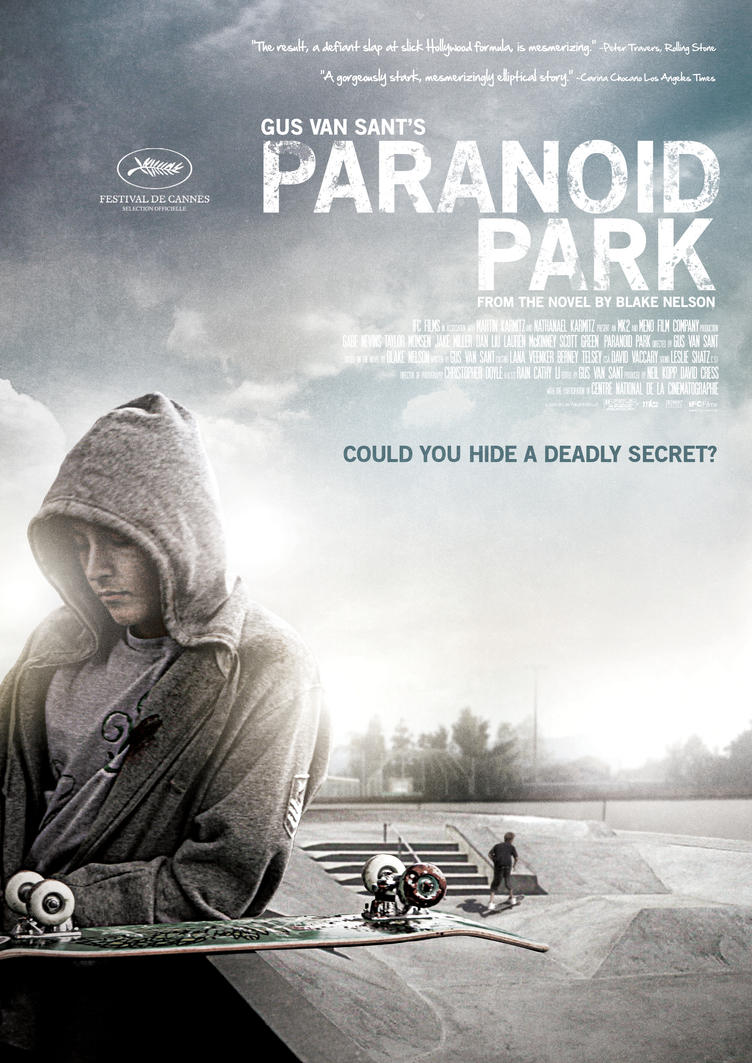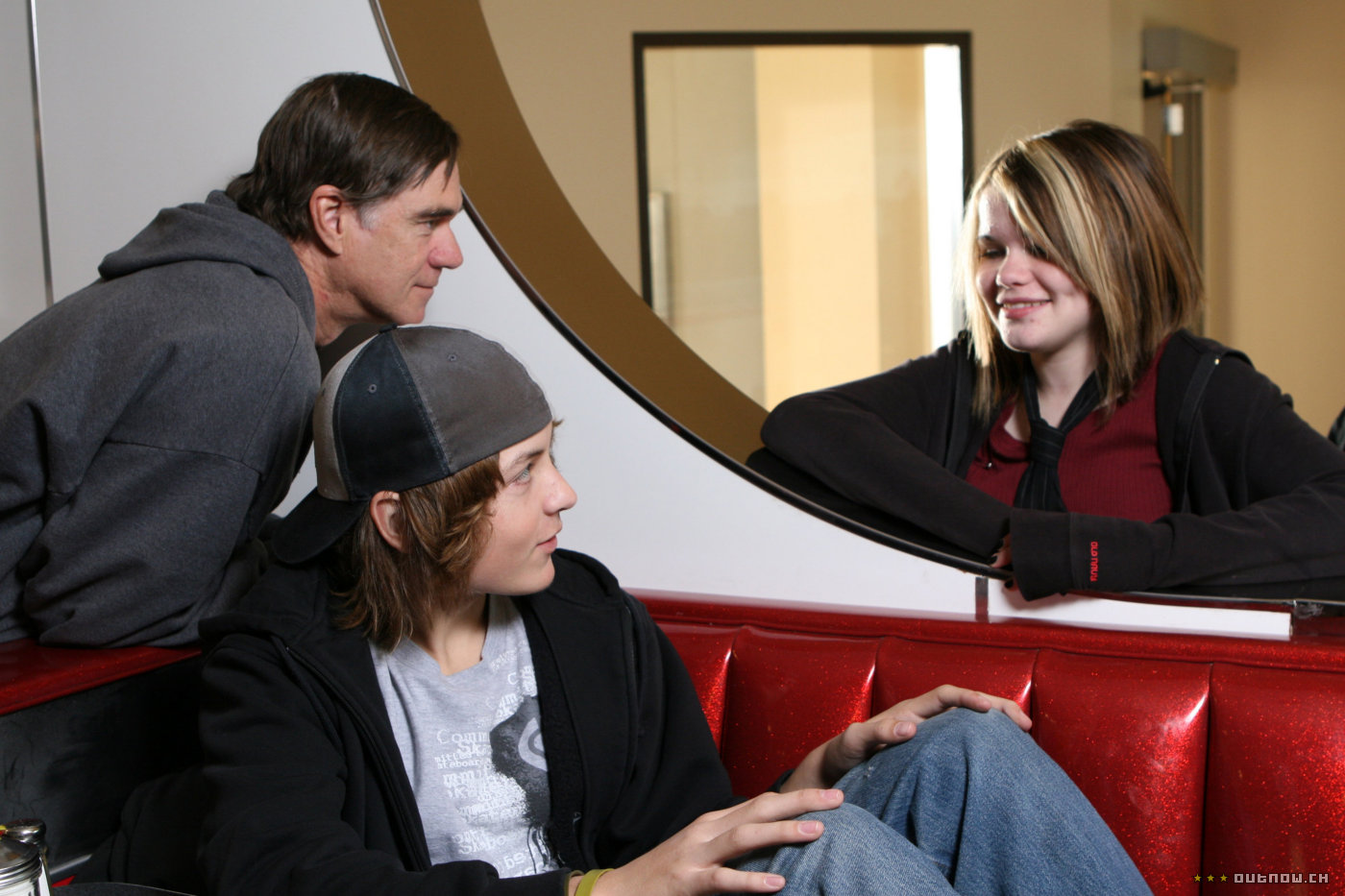
THE DIRECTOR, Gus Van Sant, made Paranoid Park in 1997. It is a real skateboarder’s picture. Having said that, I find skateboarding boring, but I enjoyed the film. It is a skateboarder’s film in the sense that it shows skateboarders in a good light- basically a big bunch of young, harmless people, performing impressive feats. No real sense of delinquency or pre-meditated violence, or use of drugs. Plenty of ennui, however, and some misguidedness, or reckless action- a film about adolescents/ adolescence.

It is also an advertisement for Portland, Oregon, where Van Sant apparently hails from. Not a glamorous depiction of the city, but an honest one showing a reasonably tight knit community without glamour. There are unhappy people in the film, and family dislocation, but that happens everywhere, from North Carolina to Texas.
The ‘star’ is a young actor called Alex in the film, known as Gabe Nevins in real life. He is handsome and photogenic and the cinematographer studies his face and body and walk just as intently as Kieslowski does the beautiful Irene Jacobs in ‘The Double Life of Veronique’ and ‘Three Colours Red.’ You can see it when, early in the film, Alex is interviewed by a policeman at school about the death of a security guard. The camera probes Alex’s mind as it focuses squarely on Alex, even there is dialogue with the policeman. The camera slowly pans towards him until it comes very close to his face. He proves to be a good liar. In real life, scant research tells me, he has spent a little bit of time in the slammer. There has been post-film homelessness and drug taking, maybe echoes of River Phoenix. Van Sant evidently auditioned a non-acting skateboarding bunch using something like myspace. Nevins never expected to be in front of the camera much, but here he is in the vast majority of shots. A win for him, and a win for Van Sant. Maybe the day he found Nevins was a casting red letter day, a mild version of the euphoria John Duigan apparently felt finding Noah Taylor and Ben Mendelsohn on the same day for the lovely ‘The Year My Voice Broke.’

There are many tricks of the camera, some clever and others simple but effective. We watch Alex walk along the school corridor, in slow motion, about to be interviewed at school by a policeman interested in the discovery of the body of a security guard, cleaved in two by a train, down at the rail yards. Van Sant’s film contains many scenes at the skateboard park. The camera lovingly showcases the skills of various skaters. One shot particularly interesting has the camera inside a tunnel watching skaters negotiate the steep sides. There is a hint of claustrophobia here, and a hint that something isn’t quite right amongst the skating fraternity.
Alex plays the teenager heavily burdened by guilt or a secret very effectively. It is a role that was similarly played by James Dean in ‘Rebel Without A Cause’, but the difference here is that Alex has less existential angst associated with him. He doesn’t shout out, or get angry, just suffers his problems quietly and numbly, more like the way that the impressionable young lead handles his more significant problems in the intelligent horror flick, ‘Snowtown.’ Alex/ Nevins is probably just playing himself. But it was clear why he was chosen. Every time the camera is on him he is in some way fascinating, not the least because of his nice, youthful looks.

At the centre of the film is that story about the security guard. His death is horrible. We get to see the body cleaved in two. What’s more, the upper half of the body lurches forward across the tracks, the facial expression pleading and helpless. Alex is understandably haunted by what he has witnessed. However he is reluctant to come forward, a typical teenage reaction. It dislocates himself from his family and his friends, as well as himself. There is a telling scene in the bedroom when his girlfriend is eager and all over him. But Alex is just numb. He barely participates in their communion, almost totally disengaged. When they break up she is incensed, and yet the filmmakers have her shouting with her voice muted. It’s like it is from Alex’s point of view. He is not really able to hear what she is saying, his depression and exhaustion being so bad.
The other way the film emphasises dislocation is by noises on the soundtrack. Sometimes there’s music and sometimes just muffled sounds. This occurs, for instance, when Alex is trying to cleanse his body and mind in the shower after the trauma of seeing the security guard dying on the railroad tracks. There is a kind of buzzing with bird squawks at the same time which is distracting and discordant. Interestingly, the music played in the scene of the accidental murder is classical- from the soundtrack to the Fellini film, ‘Juliet of the Spirits’, which gives it an elegiac feel. whenAlex is looking at the newspaper for reports of the accidental ‘murder’, he sees two female friends. His perspective of them becomes blurred as their mouths open to speak even though we can’t hear them, and the gentle movement of the scene is played in a vague, hazy kind of slow motion.
